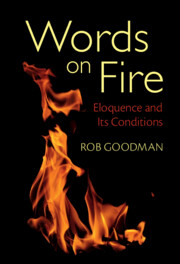Book contents
- Words on Fire
- Words on Fire
- Copyright page
- Dedication
- Epigraph
- Contents
- Acknowledgments
- Introduction: “Just Words”
- PART I Eloquence and the Ancients
- 1 “I Tremble with My Whole Heart”
- 2 The Parthenon and the Outhouse
- Postscript: Quintilian, Tacitus, and the Problem of Large-Scale Decorum
- PART II Eloquence and the Moderns
- Bibliography
- Index
2 - The Parthenon and the Outhouse
Cicero’s Demosthenes and the Uses of Style
from PART I - Eloquence and the Ancients
Published online by Cambridge University Press: 16 December 2021
- Words on Fire
- Words on Fire
- Copyright page
- Dedication
- Epigraph
- Contents
- Acknowledgments
- Introduction: “Just Words”
- PART I Eloquence and the Ancients
- 1 “I Tremble with My Whole Heart”
- 2 The Parthenon and the Outhouse
- Postscript: Quintilian, Tacitus, and the Problem of Large-Scale Decorum
- PART II Eloquence and the Moderns
- Bibliography
- Index
Summary
Chapter 2 focuses on Cicero’s last work of rhetorical theory, the Orator, and its defense of decorum. Cicero positions the pursuit of decorous, adaptable, polyvocal speech as a political commitment: the orator ought to cultivate speech across the recognized range of styles. Cicero claims that the speech of contemporaries who refuse the challenges of decorum is not just stylistically inert but politically deficient. He advances these claims by constructing a useable stylistic past centered on the Athenian orator Demosthenes. In stressing Demosthenes’s stylistic range, Cicero draws a polemical contrast between his own brand of highly stylized speech and his contemporaries who confine themselves to plain speech. Cicero’s discussion of style also constitutes a critique of the rhetorically circumscribed world that Caesar’s preeminence promised. In such a world, the speaker-audience responsiveness that accounts for much of rhetoric’s normative value would be significantly curtailed – a loss in epistemic, political, and moral terms. In the final section, I consider more general questions about stylized speech. How could Demosthenes’s range of voices be consistent with his reputation for parrhesia, or frankness? As I argue, an embrace of stylized speech can open the way for less intuitive, but more challenging and more rewarding, forms of frankness.
- Type
- Chapter
- Information
- Words on FireEloquence and Its Conditions, pp. 51 - 77Publisher: Cambridge University PressPrint publication year: 2021



